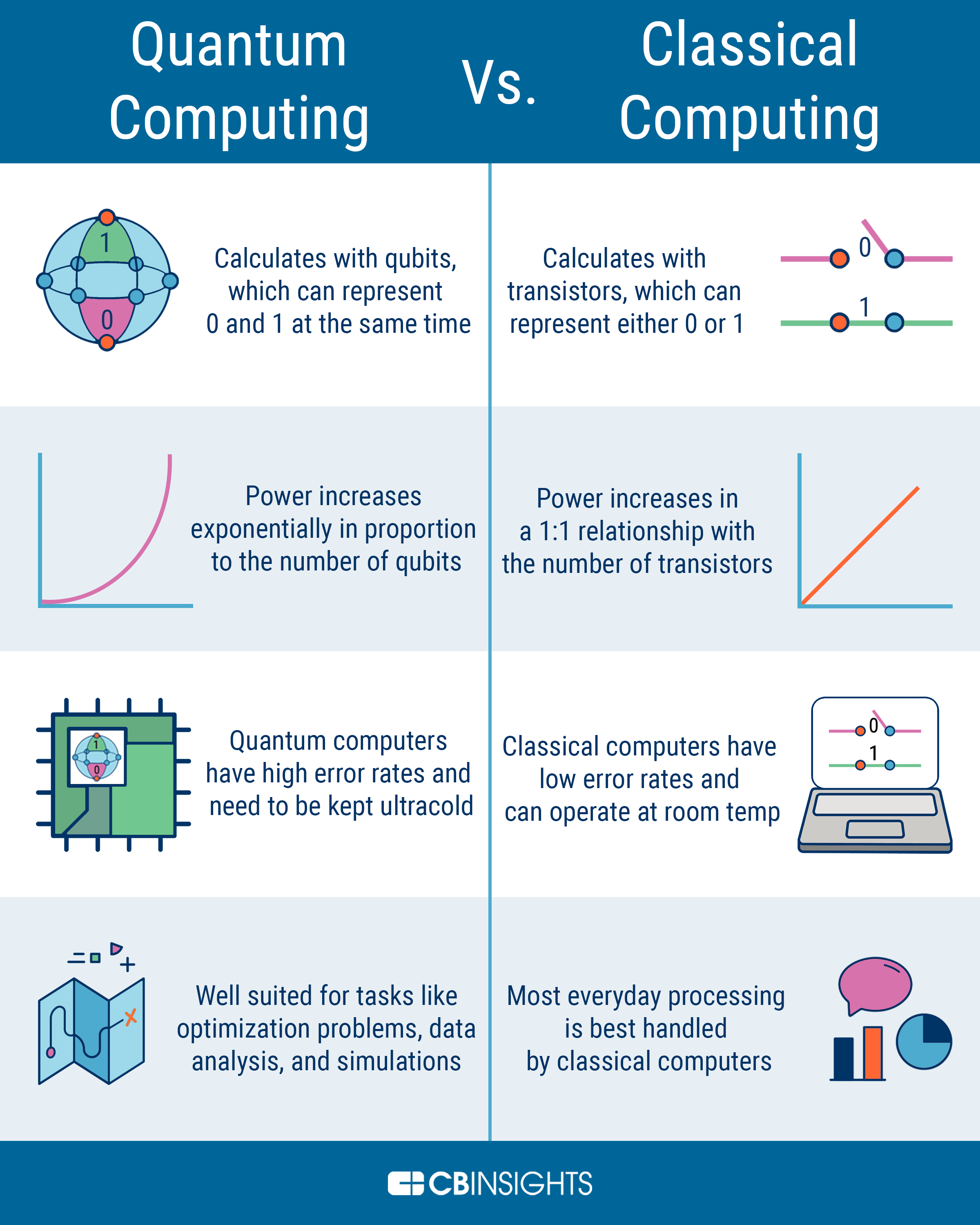Quantum Computing: A Revolutionary Leap In Computing Power For Solving Complex Problems?

Quantum Computing and Its Revolutionary Potential - thechipblog - Source thechipblog.com
Editor's Notes: "Quantum Computing: A Revolutionary Leap In Computing Power For Solving Complex Problems" have published today, 11th AUGUST 2023. Quantum computing is a fascinating field that has the potential to revolutionize many industries. In this guide, we will explore the basics of quantum computing, discuss its potential benefits, and highlight some of the challenges that need to be overcome.
Our team has done extensive research and analysis to gather information, and present it in an easy-to-understand format. We hope that this guide will help you to make informed decisions about quantum computing.
Key Differences/Key Takeaways
| Feature | Classical Computing | Quantum Computing |
|---|---|---|
| Bits | Classical bits can take on a value of 0 or 1. | Quantum bits (qubits) can take on a value of 0, 1, or both simultaneously. |
| Operations | Classical computers perform operations on bits one at a time. | Quantum computers can perform operations on multiple qubits simultaneously. |
| Speed | Classical computers are limited by the speed of light. | Quantum computers can perform certain operations much faster than classical computers. |
| Applications | Classical computers are used for a wide range of applications. | Quantum computers have the potential to revolutionize many fields, including medicine, finance, and materials science. |
Main Article Topics
The main topics covered in this guide include:
- What is quantum computing?
- How does quantum computing work?
- What are the potential benefits of quantum computing?
- What are the challenges that need to be overcome?
- What is the future of quantum computing?
FAQ
Discover answers to frequently asked questions about quantum computing. Delve into its revolutionary capabilities and potential applications for tackling intricate problems. Quantum Computing: A Revolutionary Leap In Computing Power For Solving Complex Problems

Premium AI Image | Quantum computing revolutionary technology for - Source www.freepik.com
Question 1: What distinguishes quantum computing from traditional computing approaches?
Quantum computers harness the principles of quantum mechanics, allowing them to exploit phenomena like superposition and entanglement. This enables them to perform operations that are exponentially faster than classical computers for specific types of problems.
Question 2: What are the practical applications of quantum computing?
Quantum computing holds promise for revolutionizing fields such as drug discovery, materials science, and financial modeling. By simulating complex systems more accurately and efficiently, it can accelerate breakthroughs and optimize decision-making.
Question 3: Is quantum computing a threat to cybersecurity?
While quantum computers could potentially break certain encryption algorithms, they also present opportunities for developing more robust encryption methods. Ongoing research explores the implications of quantum computing for both threats and opportunities in cybersecurity.
Question 4: What are the current limitations of quantum computing?
Quantum computing is still in its early stages of development, facing challenges such as decoherence, limited qubit counts, and high error rates. Ongoing advancements aim to overcome these limitations and pave the way for practical applications.
Question 5: What is the timeline for widespread adoption of quantum computing?
The timeline for widespread adoption is uncertain, as quantum computing is an evolving field with ongoing research and development. However, significant progress has been made, and practical applications are expected to emerge within the coming years.
Question 6: How can I learn more about quantum computing?
Numerous resources are available for exploring quantum computing further. Online courses, research papers, and industry events provide opportunities to delve deeper into the concepts, applications, and advancements in this field.
Summary: Quantum computing holds immense potential for revolutionizing problem-solving in various domains. While it faces current limitations, ongoing research and advancements are paving the way for practical applications. Understanding quantum computing empowers individuals and organizations to navigate the transformative possibilities and challenges it presents.
Explore Further: Continue your exploration of quantum computing and its implications for various industries and aspects of society.
Tips
To successfully leverage the revolutionary power of quantum computing, consider the following essential tips:
Tip 1: Identify Suitable Problems
Determine which complex problems within your domain are best suited for quantum algorithms. Consider problems involving optimization, simulation, and machine learning.
Tip 2: Understand Quantum Algorithms
Gain a foundational understanding of quantum algorithms such as Shor's algorithm for factoring and Grover's algorithm for search, and how they offer exponential speedups.
Tip 3: Leverage Quantum Computing Services
Explore cloud-based quantum computing services provided by companies like IBM, Google, and Microsoft, which offer access to quantum hardware without the need for in-house infrastructure.
Tip 4: Collaborate with Quantum Experts
Partner with experienced quantum computing researchers, engineers, or consultants to accelerate your research or application development.
Tip 5: Explore Hybrid Approaches
Combine classical computing with quantum computing to gain the benefits of both approaches. Hybrid algorithms can accelerate optimization and machine learning tasks.
Tip 6: Attend Quantum Computing Workshops and Conferences
Stay updated on the latest advancements by attending industry events and workshops. Network with quantum computing professionals and learn best practices from experts.
Tip 7: Invest in Quantum Computing Education
Support education and training programs in quantum computing at universities and research institutions to foster a skilled workforce for the future.
Tip 8: Stay Informed about Regulatory Landscape
Monitor regulatory developments related to quantum computing, as they may impact the development and deployment of quantum applications.
By following these tips, you can effectively harness the power of quantum computing to solve complex problems and drive innovation in your field.
Quantum Computing: A Revolutionary Leap In Computing Power For Solving Complex Problems
Quantum computing emerges as a groundbreaking technology with immense potential to revolutionize various industries. It harnesses quantum-mechanical principles to perform complex calculations that are currently intractable for classical computers.
- Superposition: Quantum bits can exist in multiple states simultaneously, allowing for parallel processing.
- Entanglement: Quantum bits can be linked, affecting each other's behavior regardless of distance.
- Algorithms: Quantum algorithms are designed to exploit superposition and entanglement for efficient problem-solving.
- Applications: Quantum computing finds applications in drug discovery, materials science, and financial modeling.
- Challenges: Building and maintaining quantum computers pose significant technical challenges.
- Future Prospects: Quantum computing holds immense promise for advancing scientific research and technological innovation.

The Dawn of Quantum-Inspired Laser Computing: A Revolutionary Leap | by - Source medium.com
For instance, quantum computing can accelerate the development of new pharmaceuticals by simulating molecular interactions with unprecedented accuracy. It can also enable the design of advanced materials with enhanced properties, leading to breakthroughs in energy storage and transportation. Moreover, quantum computing has the potential to revolutionize financial modeling by providing more precise risk assessments and optimization strategies.

Quantum Computing Vs. Classical Computing In One Graphic - CB Insights - Source www.cbinsights.com
Quantum Computing: A Revolutionary Leap In Computing Power For Solving Complex Problems
Quantum computing is a revolutionary leap in computing power that has the potential to solve complex problems that are currently intractable for classical computers. Quantum computers use the principles of quantum mechanics to perform calculations, which allows them to solve certain types of problems much faster than classical computers. For example, quantum computers could be used to develop new drugs, design new materials, and simulate complex systems.

Quantum Computing: Understanding its Potential in Solving Complex - Source future-assets.com
One of the most important features of quantum computers is their ability to perform superposition. This means that quantum bits (qubits) can be in multiple states at the same time. This allows quantum computers to perform certain calculations much faster than classical computers, which can only be in one state at a time.
Quantum computing is still in its early stages of development, but it has the potential to revolutionize many different fields. As quantum computers continue to improve, they could be used to solve some of the world's most challenging problems.
Here are some examples of how quantum computing could be used to solve complex problems:
- Drug discovery: Quantum computers could be used to simulate the interactions of molecules, which could help scientists to develop new drugs more quickly and efficiently.
- Materials science: Quantum computers could be used to design new materials with improved properties, such as strength, durability, and conductivity.
- Financial modeling: Quantum computers could be used to develop more accurate and sophisticated financial models, which could help investors to make better decisions.
Quantum computing is a powerful new tool that has the potential to solve some of the world's most challenging problems. As quantum computers continue to improve, they could revolutionize many different fields and help us to make significant progress on some of the most important issues facing humanity.
